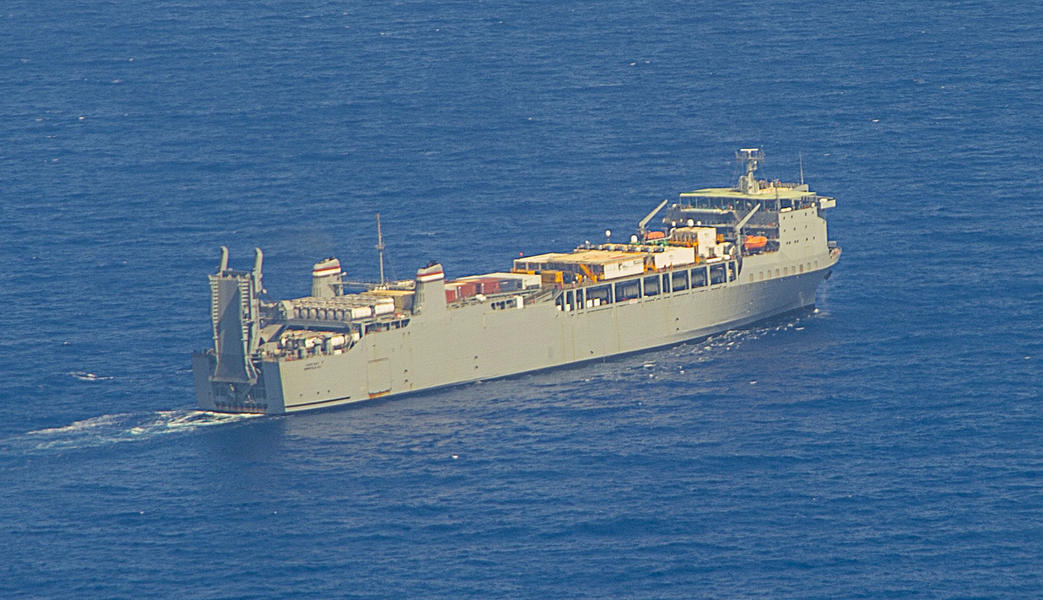Syria's declared chemical weapons have all been destroyed, U.S. says


A free daily email with the biggest news stories of the day – and the best features from TheWeek.com
You are now subscribed
Your newsletter sign-up was successful
In a bit of rare good news from the Middle East, the Pentagon announced Monday that the U.S. has destroyed Syria's entire declared arsenal of chemical weapons. Since no nation agreed to accept the collected chemical agents, U.S. military and civilian personnel neutralized them in international waters aboard the M/V Cape Ray, a specially outfitted 647-foot cargo ship.
The roughly 600 tons of methylphosphonyl difluoride, or DF — used to make sarin and other nerve gasses — and 20 tons of mustard gas were destroyed with water and bleach in custom-built hydrolysis machines. The byproduct is hazardous waste, but not particularly toxic, U.S. officials say. In another pleasant surprise, the work was completed weeks ahead of a deadline set by the Organization for the Prohibition of Chemical Weapons.
President Obama hailed the news as "an important achievement in our ongoing effort to counter the spread of weapons of mass destruction," but he warned Syrian President Bashar al-Assad that the U.S. and its allies "will watch closely to see that Syria fulfills its commitment to destroy its remaining declared chemical weapons production facilities." He also expressed concern about the suspected undeclared chemical weapons Syria is likely still holding on to.
The Week
Escape your echo chamber. Get the facts behind the news, plus analysis from multiple perspectives.

Sign up for The Week's Free Newsletters
From our morning news briefing to a weekly Good News Newsletter, get the best of The Week delivered directly to your inbox.
From our morning news briefing to a weekly Good News Newsletter, get the best of The Week delivered directly to your inbox.
Assad agreed to give up his chemical weapons after a suspected government chemical weapons attack on a Damascus suburb killed more than 1,000 people, and Obama threatened to launch retaliatory airstrikes against Syrian government targets.
A free daily email with the biggest news stories of the day – and the best features from TheWeek.com
Peter has worked as a news and culture writer and editor at The Week since the site's launch in 2008. He covers politics, world affairs, religion and cultural currents. His journalism career began as a copy editor at a financial newswire and has included editorial positions at The New York Times Magazine, Facts on File, and Oregon State University.
-
 How to Get to Heaven from Belfast: a ‘highly entertaining ride’
How to Get to Heaven from Belfast: a ‘highly entertaining ride’The Week Recommends Mystery-comedy from the creator of Derry Girls should be ‘your new binge-watch’
-
 The 8 best TV shows of the 1960s
The 8 best TV shows of the 1960sThe standout shows of this decade take viewers from outer space to the Wild West
-
 Microdramas are booming
Microdramas are boomingUnder the radar Scroll to watch a whole movie
-
 British warship repels 'largest Houthi attack to date' in the Red Sea
British warship repels 'largest Houthi attack to date' in the Red SeaSpeed read Western allies warn of military response to Iranian-backed Yemeni rebels if attacks on ships continue
-
 Houthi rebels claim Red Sea ship attacks
Houthi rebels claim Red Sea ship attacksspeed read Iran-backed Yemeni group vows to escalate aggression towards Israel-linked vessels in revenge for Gaza war
-
 Israel plans next phase of Gaza war as first hostages released
Israel plans next phase of Gaza war as first hostages releasedSpeed read After four-day ceasefire 'we will not stop' until destruction of Hamas, says Israel
-
 Mob storms Russian airport 'looking for Jews'
Mob storms Russian airport 'looking for Jews'Speed Read Plane from Israel surrounded by rioters chanting antisemitic slogans after landing in Russia's Dagestan region
-
 Tuberville's military promotions block is upending lives, combat readiness, 3 military branch chiefs say
Tuberville's military promotions block is upending lives, combat readiness, 3 military branch chiefs saySpeed Read
-
 Ukraine's counteroffensive is making incremental gains. Does it matter in the broader war?
Ukraine's counteroffensive is making incremental gains. Does it matter in the broader war?Speed Read
-
 US commissions first-ever Navy ship in a foreign port
US commissions first-ever Navy ship in a foreign portSpeed Read
-
 British spy chief, Wagner video suggest Prigozhin is alive and freely 'floating around'
British spy chief, Wagner video suggest Prigozhin is alive and freely 'floating around'Speed Read
